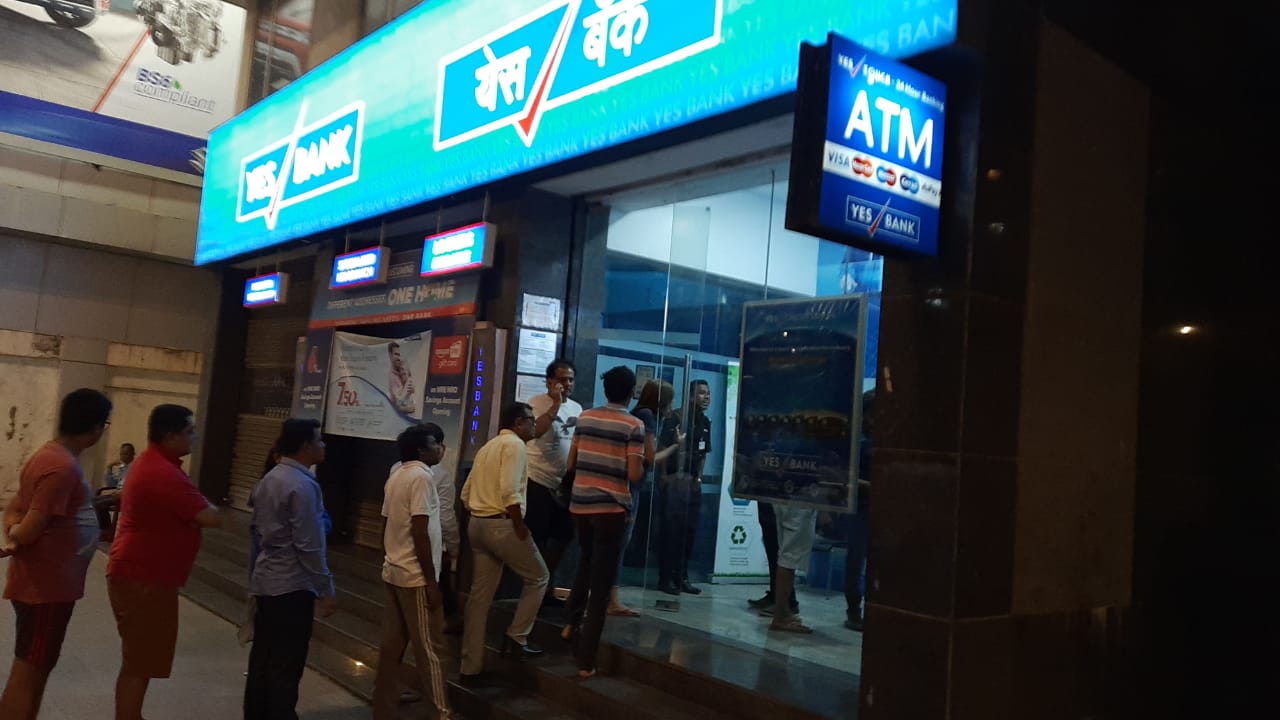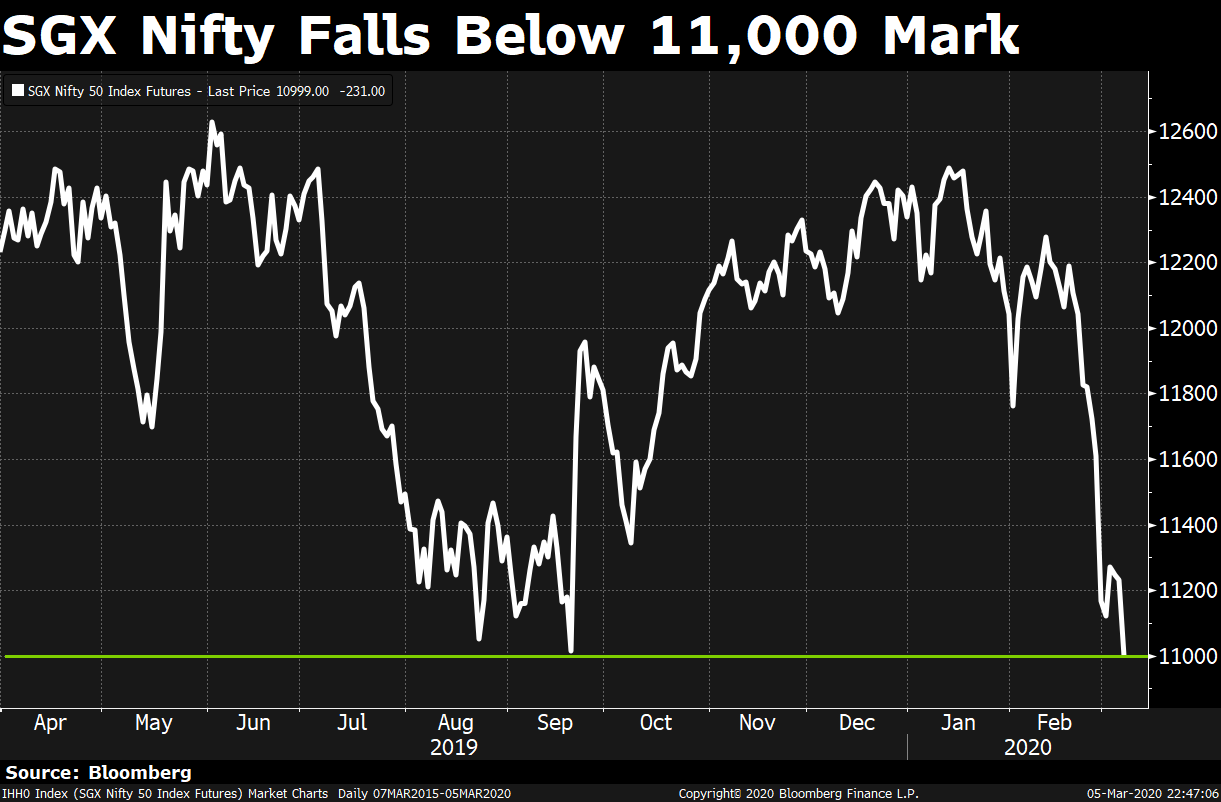.jpg?downsize=773:435)
The Government of India placed Yes Bank Ltd. under moratorium and capped withdrawals for a month, while the Reserve Bank of India superseded the board of the private lender citing a steady decline in its financial position.
The Ministry of Finance took the decision after considering an application submitted by the Reserve Bank of India, said a ministry statement on Thursday evening. The moratorium will last till April 3 and all legal proceedings against the bank will be stayed during the period, it said.
...the Central Government, after considering an application made by the Reserve Bank of India under sub-section (1) of that section, hereby makes an Order of Moratorium in respect of the Yes Bank Limited, Mumbai, Maharashtra for the period from 18:00 hrs on March 5, 2020 up to and inclusive of April 3, 2020 and hereby stays the commencement or continuance of all actions and proceedings against that banking company during the period of moratorium...Finance Ministry statement
It's the first instance of a large private bank being put under such a moratorium by the government. Earlier on Thursday, Bloomberg reported that the government has approved a proposal to allow a consortium led by government-owned State Bank of India to invest in the struggling lender. Late Thursday night, SBI confirmed that its board had given an in-principle approval to explore an investment opportunity in Yes Bank.
This indicates that the moratorium or freeze on activity at Yes Bank has been imposed by the government keeping in mind that a rescue may be around the corner. Yet, till a solution is found, whether it is an equity investment or merger, depositors of Yes Bank will bear the burden of limited withdrawals.
Impact On Depositors
The bank is not allowed to pay any depositor more than Rs 50,000 without written permission from the RBI during the period of moratorium.
- This is irrespective of how many accounts depositor may have in the bank.
- If the depositor has dues payable to the bank, those will be adjusted first before withdrawal of any amount
In certain emergencies, RBI may permit a Yes Bank depositor to withdraw more than Rs 50,000 but up to Rs 5 lakh. These circumstances include:
- medical treatment of the depositor or any person actually dependent on him;
- towards the cost of higher education of the depositor or any person actually dependent on him for education in India or outside India;
- To pay obligatory expenses in connection with marriage or other ceremonies of the depositor or his children or of any other person actually dependent upon him;
- in connection with any other unavoidable emergency.

Yes Bank's Reconstruction
The central bank, in a separate statement, said the the financial position of Yes Bank has undergone a steady decline due to inability of the bank to raise capital to address potential loan losses and resultant downgrades. That, it said, triggered invocation of bond covenants by investors and withdrawal of deposits.
“The bank has also experienced serious governance issues and practices in the recent years which have led to steady decline of the bank,” the RBI said.
It intends to draw up a scheme for reconstruction or amalgamation of the bank before the moratorium period ends.
In terms of the provisions of the Banking Regulation Act, the Reserve Bank will explore and draw up a scheme in the next few days for the bank's reconstruction or amalgamation and with the approval of the Central Government, put the same in place well before the period of moratorium of thirty days ends so that the depositors are not put to hardship for a long period of time.RBI Statement
Other Restrictions
Starting 8 p.m. on Thursday, Yes Bank has been prohibited from making any loans, investments, payments, or transfer any properties, said another RBI statement, except for payments towards bills already received, employee salaries, rent, taxes, etc.
Yes Bank has also been allowed to release or deliver goods or securities which have been pledged, hypothecated or mortgaged to it against loans availed by the borrowers, according to the government's statement. The securities can be released if the bank has either received full repayments unconditionally or in any other case without reducing the proportions of the margins on the securities.
Board Superseded
RBI has, in consultation with the government, superseded Yes Bank's board of directors for a period of 30 days “owing to serious deterioration in the financial position of the Bank”.
This has been done to quickly restore depositors' confidence in the bank, including by putting in place a scheme for reconstruction or amalgamation, said an RBI statement.
Prashant Kumar, former deputy managing director and CFO of State Bank of India, has been appointed as the administrator of Yes Bank.
The Back Story
Ravneet Gill, who took over as Yes Bank's managing director and chief executive officer in March 2019, has been trying to raise nearly $1.2 billion for the bank as it looks to increase provisions against bad loans and fund its future growth.
The Mumbai-based private lender's first attempt last year at inducting new investors failed to pass muster. More recently Yes bank disclosed that it has received non-binding expressions of interest from JC Flowers & Co. LLC, Tilden Park Capital Management LLP, OHA (U.K.) LLP and Silver Point Capital, it disclosed to the stock exchanges on Feb. 12.
The bank delayed reporting third quarter earnings to March 14th. It is widely expected that by then the bank would need to have finalised the capital raise plan.
On March 3, BloombergQuint had reported that potential investors in Yes Bank are seeking participation from “sovereign banks” in any fundraising. This, the investors believe, would help reassure the bank's depositors and safeguard any new investment into the lender, according to two people with direct knowledge of the matter.
Participation in fundraising also hinged on a relaxation in SEBI's pricing guidelines, which are based on historical pricing and hence make it expensive for investors to invest in a company that has seen a substantial decline in stock price as Yes Bank has.
Yes Bank's gross non-performing asset ratio stood at 7.39 percent as of September. The bank's management also announced a Rs 31,000 crore book rated BBB and below, of which at least a quarter could turn bad. Without adequate capital, the bank would see its common equity tier-1 ratio will fall below the regulatory minimum of 8 percent.
Market Impact
The news of the Yes Bank moratorium will hurt equity markets, already volatile due to the corona virus impact. Late evening Thursday, an hour after the government announced the moratorium, the SGX Nifty traded 2 percent lower. This offers an indication of the potential weakness local equities will face on Friday morning when trading resumes.

Market experts expect significant pressure on Yes Bank shares. The stock rallied in Thursday trade on a Bloomberg news report that an SBI-led consortium may rescue the bank. It was up 26 percent at Rs 36.80 per share.
Essential Business Intelligence, Continuous LIVE TV, Sharp Market Insights, Practical Personal Finance Advice and Latest Stories — On NDTV Profit.























